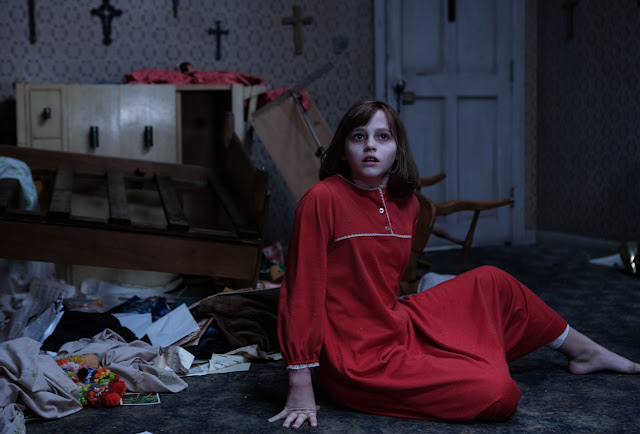"Mostly lifeless for Poe’s otherwise seething stories of
death.”
Five stories by Edgar Allan Poe are told in various visual
styles in Extraordinary Tales, an
anthology of animated short films from Spanish writer-director Raul Garcia.
While each has distinctive storytelling approach, all shorts fairly
succeed in the depicting the silent dread and stirring undercurrents in the
literary master’s stories of epidemic, murder, torture, guilt and madness.
“The Fall of the House of Usher,” narrated by Christopher Lee, is the opening tale. It’s a story about an unnamed person who visits his
childhood friend, Roderick Usher, who suffers mental illness along with his
twin sister. The short is initially vibrant with its Expressionist water colors
and it gradually turns to earth and dead tone as it becomes engrossed with
mysteries. Lee’s basso perfectly evokes an air of terror in the film and so do the characters' chiselled 3D countenance. Yet, most elements are too
familiar of haunted houses stories that the flick in general seems flat and
dull.
The second story, “The Tell-Tale Heart,” is about a person
who murders an old man who he lives with because the latter’s “vulture eyes”
distress him. The feature is more stylized and daring than the first. Except
for occasional splashes of red, its palette is entirely black and white. A
vintage scratchy recording by Bela Lugosi tells the story in a convincingly
chilly and mad fashion.
“The Facts in the Case of M. Valdemar” explores the effect
of mesmerism or hypnotism to a dying person. It’s one of Poe’s highly discussed
tales though not as popular as the others. Its material is hilarious but one
not commonly dealt with in modern sci-fi films. Narrated by Julian Sand, the
feature pays homage to comics. The panelled visuals, grotesque angles and
characters placement, and the contrasting and striking colors intensify the
tale’s eerie atmosphere.
“The Pit and the Pendulum” takes on a more contemporary
approach in animation. It is a photorealism with multiple screens exhibiting
computer-generated 3D images. It is about a prisoner confined in a cell with a
deep pit in the center and who is later subjected to torture by a swinging
razor pendulum. It is another intense story, backed up by a breathless
narration by horror and suspense genius Guillermo del Toro.
The last offering is “The Masque of the Red Death,” one of
Poe’s most celebrated stories. It follows Prince Prospero’s failed attempt to
avoid a pandemic known as the Red Death by hiding himself and his nobles inside
a castellated abbey. It is perhaps the visually strongest among the stories in
the movie. The colors are striking, mostly contrasting or presented in
different hues. One sequence also suggests nudity and sexual orgies. Yet, it is
also one of the film’s weakest tales. Except for a single line delivered by Roger Corman, it lacks any intelligible dialogues. The absence of words, lazy pace
and overall ambiguity may disappoint viewers, especially those unfamiliar with
the story.
The five tales are connected and spaced by an autumn
graveyard interaction between a lady statue symbolizing Death (voiced by
Cornelia Funke) and a raven (Stephen Hugues) which represents Poe. The
conversations circle around the writer’s obsession with death.
In general, Extraordinary
Tales is more of a visual exercise that a genuine exposition of Poe’s
literary pieces. The shorts are creative, handsome, striking and mournful but
not all effectively capture the charm and magic in Poe’s stories. They are
simply too inert and subdued to bring enough life and momentum to the
materials.
Production
companies: Melusine Prods., Melon
Digital, R&R Communications, the Big Farm presentation, with the support of
Film Fund Luxembourg
Voices: Christopher
Lee, Bela Lugosi, Julian Sands, Guillermo del Toro, Roger Corman, Stephen
Hugues, Cornelia Funke
Director-screenwriter:
Raul Garcia, based on stories by Edgar Allan Poe
Producers: Stephan
Roelants, Melusine Prods
Art Director: Stephane Lecocq
Music: Sergio de la
Puente
Editors: Aurelien Antezac, Cedric Gervais, Damien Bayard




























0 comments:
Post a Comment